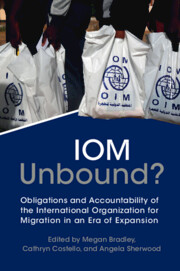‘For me, the IOM was always an international organization lurking in the background, always part of the crowd but never really big or interesting enough to warrant too much attention. Over the last decade it has accumulated greater status - alongside considerable mystery regarding its history, accomplishments, ambitions, legal obligations, and moral compass. Will it become another international organization prepared to do the bidding of the major powers and try and contain migration? Or will it become a needed voice in the fight for the rights and protection of the growing number of global migrants? This necessary volume puts into tension the practice and ethics, the retrospective and prospective, in fascinating ways.’
Michael Barnett - University Professor of International Affairs and Political Science, George Washington University
‘Global migration governance is rapidly evolving. In the 2018 Global Compact for Migration, 152 States have agreed upon a long-term program for ‘facilitating mobility’, which runs contrary to what most States are currently doing. IOM has come to the light as a major player in this transformation and its oft-heralded positioning as a 'non-normative' service organisation is being challenged. This collection vividly captures the moment when discreet efforts over the past decades come to fruition and IOM is starting to recognise and embrace its new responsibilities, particularly, despite resistance by many States, towards migrants themselves.’
François Crépeau - Hans & Tamar Oppenheimer Professor of Public International Law, McGill University, former UN Special Rapporteur on the Human Rights of Migrants
‘To what extent is an international organization without a protection mandate obliged and able to act in accordance with international human rights? And how can such an organization be held accountable if it defies protection standards? These questions are highly relevant to IOM and its work with migrants, internally displaced persons, and refugees. The contributions in this highly topical book, which innovatively combines scholarship in the field of international law and international relations, provide often unexpected answers for readers interested in the work of the IOM as well as for those studying international organizations more generally.’
Walter Kälin - Professor Emeritus of law, University of Bern, former Representative of the UN Secretary-General on the Human Rights of Internally Displaced Persons
‘IOM Unbound? is an essential guide to understanding the ‘new’, post-2016 IOM. In its well-chosen and well-integrated chapters, leading scholars unpack the extent of change in IOM following its entrance into the 'UN system' as a related agency. They explore the institution's experience as norm-breaker, taker and (potentially) maker in deeply researched explorations of the institution's legal obligations, accountability mechanisms, and record of expansion. This volume will be essential reading for both experts in international migration and general readers interested in exploring the dynamics of global governance.’
Michael Doyle - University Professor, School of Public and International Affairs, Columbia University
‘For too long the International Organization for Migration (IOM) has remained in the shadows of analyses from specialists in international relations and international law. The contributors have asked honest questions and are seeking honest answers about one of the least well-known institutions of global migration governance. Having only recently become ‘related’ to the United Nations system, this remarkable set of essays about the IOM knits together essential insights from social science and law that scholars and practitioners alike require to understand the growing membership, staff, and budgets, along with the increasing power and presence of this unusual international organization. The critical but constructive chapters are essential to comprehend the past, present, and future of this entrepreneurial and service-driven agency that seeks to alleviate the seemingly ever-growing presence worldwide of refugees and internally displaced persons.’
Thomas G. Weiss - Presidential Professor of Political Science, CUNY Graduate Center
‘This significant and timely collection provides unparalleled insights into the structure, operation, and accountability of IOM. Through critical normative and empirical analysis by diverse scholars of international law and international relations, the book skilfully charts the evolution of IOM’s mandate, practices, and approaches over time. The result is an original and thorough evaluation of IOM’s influence on the global governance of mobility.’
Jane McAdam AO - Scientia Professor of Law, University of New South Wales
‘This outstanding book delivers a sophisticated account of the history, law, and politics of IOM. The authors’ focused attention on this important but overlooked organization yields many broadly applicable insights and lessons, especially on the still-pressing issue of accountability of international organizations.’
Kristina Daugirdas - Professor of Law, University of Michigan
‘The individual contributions fill important gaps in the scholarly analysis of the IOM and provide information on the need for further research for the further development of the organization.’
Ekkehard Strauß
Source: Vereinte Nationen



